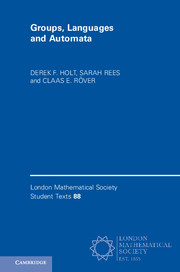Preface
Published online by Cambridge University Press: 16 March 2017
Summary
This book explores connections between group theory and automata theory. We were motivated to write it by our observations of a great diversity of such connections; we see automata used to encode complexity, to recognise aspects of underlying geometry, to provide efficient algorithms for practical computation, and more.
The book is pitched at beginning graduate students, and at professional academic mathematicians who are not familiar with all aspects of these interconnected fields. It provides background in automata theory sufficient for its applications to group theory, and then gives up-to-date accounts of these various applications.We assume that the reader already has a basic knowledge of group theory, as provided in a standard undergraduate course, but we do not assume any previous knowledge of automata theory.
The groups that we consider are all finitely generated. An element of a group G is represented as a product of powers of elements of the generating set X, and hence as a string of symbols from, also called words. Many different strings may represent the same element. The group may be defined by a presentation; that is, by its generating set X together with a set R of relations, from which all equations in the group between strings can be derived. Alternatively, as for instance in the case of automata groups, G might be defined as a group of functions generated by the elements of X.
Certain sets of strings, also called languages, over A are naturally of interest. We study the word problem of the group G, namely the set WP(G, A) of strings over A that represent the identity element. We define a language for G to be a language over A that maps onto G, and consider the language of all geodesics, and various languages that map bijectively to G. We also consider combings, defined to be group languages for which two words representing either the same element or elements that are adjacent in the Cayley graph fellow travel; that is, they are at a bounded distant apart throughout their length.
- Type
- Chapter
- Information
- Groups, Languages and Automata , pp. ix - xiiPublisher: Cambridge University PressPrint publication year: 2017



